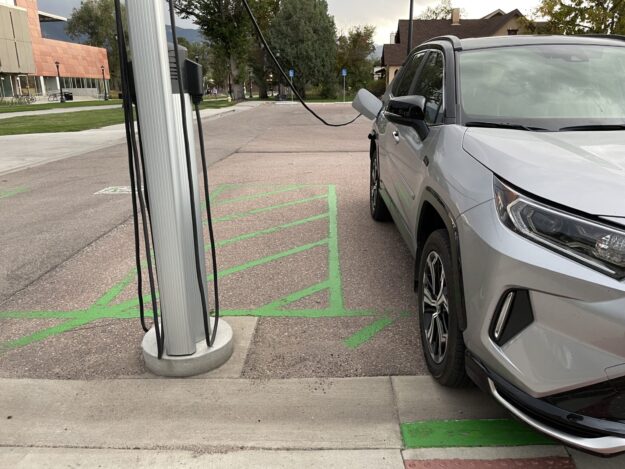Widgetized Section
Go to Admin » Appearance » Widgets » and move Gabfire Widget: Social into that MastheadOverlay zone
Bill to require electric vehicle charging for new, large residential, commercial buildings advances in House

Over protests from Republicans, the Colorado House advanced a policy to require electric vehicle charging equipment at large residential and commercial buildings.
The latest version of House Bill 22-1218, sponsored by Rep. Alex Valdez, a Denver Democrat, would require new commercial buildings above a certain size to have electric vehicle charging for at least 10% of their parking spaces. New multifamily apartment buildings would require electric vehicle charging infrastructure for 20% of their parking spaces.
The electric vehicle charging requirements would apply mostly to new developments — minor renovation projects on existing buildings would be exempt.
HB-1218 would also require new buildings to include the electrical system capacity to expand electric vehicle charging to more parking spaces in the future. Builders, master electricians and architects would be accountable for adhering to these requirements when planning and supervising electrical wiring and construction.
Rep. Andres Pico, a Colorado Springs Republican, argued that by imposing new regulations on developers, HB-1218 would create more barriers to building affordable units, exacerbating an existing housing crisis in the state. It would also increase demand for electricity in a time when energy costs are soaring, he said.
“That is a cost the utilities have to pick up, and that is a cost that has to go across to everybody,” Pico said on the House floor. “It pulls an additional cost on the utilities that all of us will have to pay, whether you have an electric car or not.”
Other Republicans, including Minority Leader Hugh McKean and Rep. Dan Woog of Erie, argued that the choice of whether to install electric vehicle infrastructure should be left up to builders responding to market demand and that a government mandate would lead to higher costs for consumers.
“The (electric) cars are coming, and we want to make sure the infrastructure is there in new buildings,” Valdez said in response to those concerns. He noted that it would cost much more to retrofit buildings later than to have the infrastructure already in place when electric cars became the vehicles of choice for a majority of consumers.
Valdez also pointed out that the Environmental Protection Agency recently proposed downgrading the Denver metro area from a “serious” to “severe” violator of ozone health standards. Nitrogen oxides and volatile organic compounds emitted from gas-powered vehicles and other sources combine with sunlight to create ground-level ozone.
“This should not be an air quality denialist legislative session,” agreed Rep. Matt Gray, a Broomfield Democrat.
Lawmakers on the House Energy and Environment Committee voted 8-3 on April 14 to refer HB-1218 to the full House of Representatives, with Republican Reps. Perry Will of New Castle, Woog and Pico voting “no.” Reps. Dave Williams, a Colorado Springs Republican, and Ron Hanks, a Republican from Cañon City, were both excused for the committee vote. The bill passed the House on an initial voice vote Tuesday and will get one more recorded vote before heading to the Senate for consideration.
Among the supporters of HB-1218 are the Colorado Sierra Club, an environmental advocacy group; California-based electric vehicle infrastructure company ChargePoint; the Colorado Rural Electric Association representing electric cooperatives; and the Southwest Energy Efficiency Project, which advocates for more efficient energy use in Arizona, Colorado, Nevada, New Mexico, Utah and Wyoming.
Opponents include Weld County; the International Brotherhood of Electrical Workers Local 111; the Colorado Competitive Council, an affiliate of the Denver Metro Chamber of Commerce; the Denver Metro Building Owners and Managers Association; and the International Council of Shopping Centers.
Editor’s note: This story first appeared on Colorado Newsline, which is part of States Newsroom, a network of news bureaus supported by grants and a coalition of donors as a 501c(3) public charity. Colorado Newsline maintains editorial independence. Contact Editor Quentin Young for questions: info@coloradonewsline.com. Follow Colorado Newsline on Facebook and Twitter.
Faith Miller
Latest posts by Faith Miller (see all)
- Eagle County first to try to use new state law to ask voters for lodging tax to fund housing, child care - July 17, 2022
- Roberts, Solomon SD8 race seen as critical to Republicans regaining control of state Senate - July 5, 2022
- Colorado taxpayers likely to see much higher refunds than originally forecast, officials say - June 21, 2022


